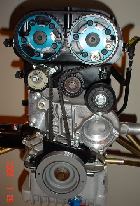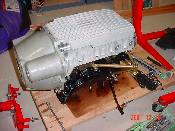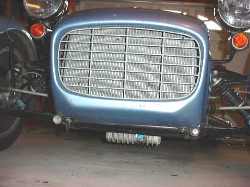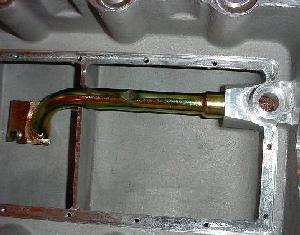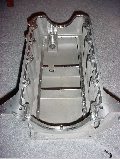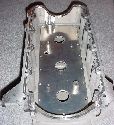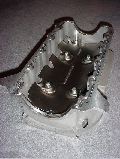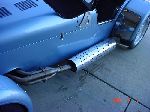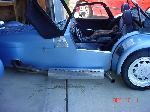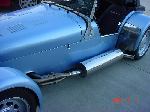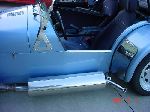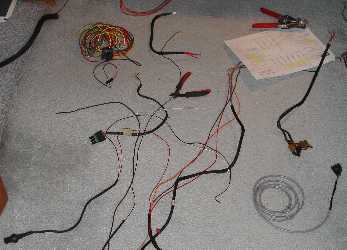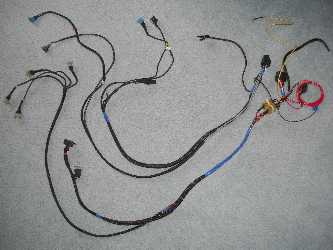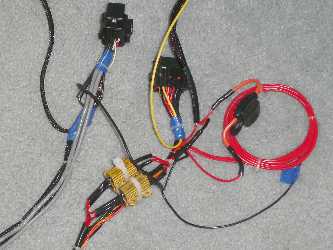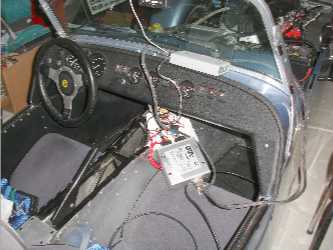 Sound of this Zetec in 3rd-4th
gear .9MB .wav Sound of this Zetec in 3rd-4th
gear .9MB .wav |
Ford Crossflow (Kent) to Zetec conversion |
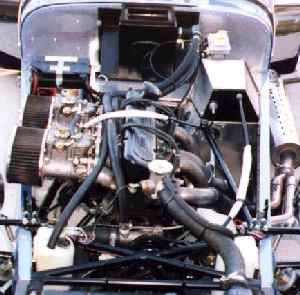 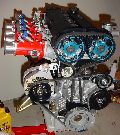 |
|||||||||
Main Page What's a Seven? Driving Build-page-story Build-page-pics Zetec vs. X-Flow Conversion to Zetec Gearbox upgrade Maintenance Log USA7-777 Gallery Registration Books Links |
March
2002: build up
a 200 BHP version of the 2 ltr Ford Focus Zetec to the replace the
150 BHP 1.7 ltr Ford Crossflow, aka Kent engine.
Note: From
March 2002 to December 2008, about 50k miles have
been accumulated with the Zetec engine described here. Mostly street, but also a dozen or so track events. Some
key requirements:
1. fit in the same place as the Crossflow. The current US-spec Zetec Caterhams have the engine back by 2 inches. I also wanted to retain the existing gear shift location, the exhaust exit from the body, drive shaft and tunnel cover. The Zetec will thus be placed in the old Cross-flow location. This will just barely clear the timing belt within the nose cone.
2.
switch from carbs to EFI requires a more complete fueling system, with
an
intermediate swirl pot, to avoid fuel starvation during lateral
acceleration and to adopt the carburetor float bowl
buffer function. Fueling
is arranged per Raceline's recommendation
with a low (4psi) pressure piezo pump feeding the swirl pot &
filter,
which
in turn feeds a 43psi high pressure pump. These items
are
mounted behind the rear bulkhead, on either side of the
differential. The
pressure regulator is mounted close to the injectors, to minimize
pressure oscillations.
|
|
|||||||||
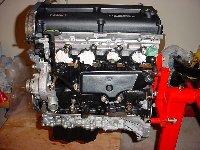 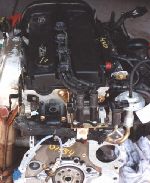 |
2001
Focus engine obtained from a crashed
US-spec Focus ZX3 dealer
vehicle.
The dealer mats were still in the car. 120 miles on the odometer.
Steering
pump fluid all over the engine, but otherwise like new.
As it comes out of the Focus it's a cluttered assembly, yet
under it
all
is a pretty compact engine. |
||||||||||
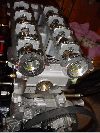 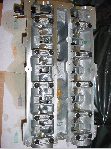 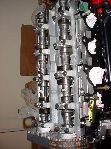 |
Cams
will be replaced with Raceline 200
spec Kent cams. These have 270dg duration, fuller [Time x Duration] curve and 9.75mm lift 30mm Tappets |
||||||||||
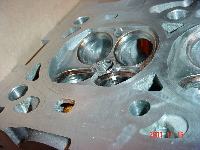 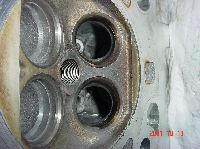 |
Std.
head thickness is about
180mils. Taking off
40mil, will raise CR from the std. 9.6:1 to
10.5:1
Look low-center in the left image, through the coolant
passage
to see
the 'before' 180mil head thickness. It's not generous. For further CR
increases modified pistons are recommended. Right image - before porting... lots of room for cleanup. |
||||||||||
| Raceline
Kent cams (left) and ZX3 Focus
cams. Main difference is
faster
rise and and close ramps, significantly increasing time-duration.
Kent vernier cam wheels facilitate timing. |
|||||||||||
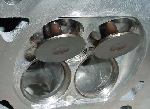 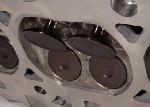 |
inspecting
flow around the valves with
valves at full lift
with new
cams and at .050". The combination of a vacuum cleaner and a flow meter will work reasonably well. At low openings, the edge of the squish area actually disrupts flow and should be "smoothed", same around the plug area. |
||||||||||
 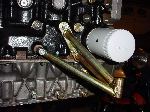 |
Plated
engine mounts make great handles
while working with
the engine.
Left side needs a spacer and some re-alignment |
||||||||||
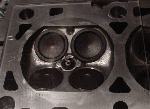 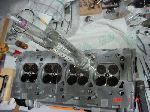 |
Cc-ing
the chambers to ensure equal
chamber volumes. Use thin oil to reduce spillage. Spark plug elevations are used for adjustment. See valve flow inspection pics above (2 rows back). |
||||||||||
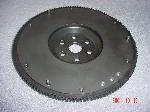 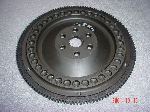  |
Raceline
Flywheel 5.8kg. Starter ring
located for match with
Crossflow
bell housing and starter patterns. New clutch as well. I retained the
original
cable
operated arrangement. Note automatic (L) vs manual crank trigger housing. Glad someone pointed that out to me... thanks Doug! |
||||||||||
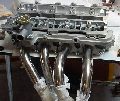 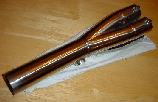 |
Successful
trial fit of water rail and
exhaust headers. The
water rail needs
machining at the front to fit US 2.0ltr Focus head. Headers are very
close
to equal length, unlike the original headers that were shipped with the
Crossflow.
Polished stainless collector artwork as received. |
||||||||||
|
The
Raceline
Sump has a baffle cover and a windage tray
in addition to the
compartments
in the base. The windage tray reduces oil pickup on the crank counter
weights, while the boxing of the oil reduces oil starvation during
lateral acceleration. Differences in detail exist between EU and US spec engines, so be prepared for the occasional fitting and grinding. |
||||||||||
 |
Lumenition 45mm throttle bodies and throttle linkage | ||||||||||
  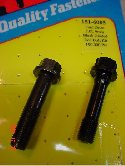 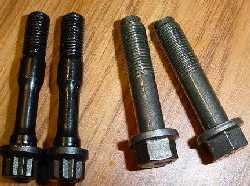 |
Far Left
- ARP rod bolts installed. |
||||||||||
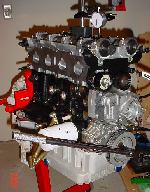 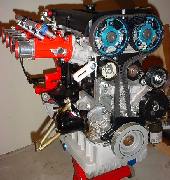 |
Left
- conventional method for finding
TDC with dial
indicator. There
is an opening on the left of the block for a special Ford tool, which
isn't
needed.
Right - fully assembled. The alternator does not fit. Had to
order a
new alternator. The 45amp right side mounted Valeo works with the
brackets
provided by Raceline. |
||||||||||
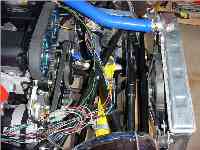 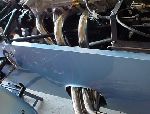 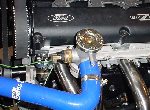 |
Installation
in progress (4/14/02) Left: Wiring. Mid & Right: Headers fit perfect, and are very near equal length. On the Focus (ZX series) engine, the dip stick (on top) does not fit like the Contour/Mondeo engines and needs some bending of the bracket to land just behind the new thermostat housing. I.e. provided the Raceline water rail is being used, which moves the T.stat to the forward location. |
||||||||||
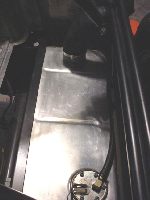 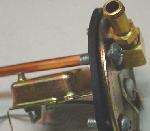 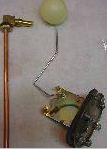 |
Fuel
return from the swirl pot goes in
next to the fuel
gauge potentiometer.
Not much room to work with, but it all just works out. Note slight
relief
of the disc, just under the fitting, which is needed to provide
clearance for
the
hose.
The original vented filler cap is retained. The added
length of copper
tubing for the return, reduces vapour buildup in the tank, by reaching
near the bottom
of the tank. |
||||||||||
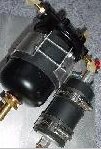 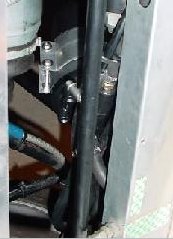 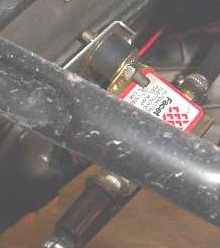 |
From
left: Swirl pot and high pressure pump on Alu mounting
plate. The 45
dg
orientation
is to ensure that hoses do not project below the boot floor or chassis
floor.
This assembly is mounted to the right of the diff, the low
pressure
piezo pump is mounted to the left of the diff, on a bulkhead diagonal. The low pressure Piezo Facet pump is mounted on rubber
isolators. This also implies the need for
Also note small in-line filter. |
||||||||||
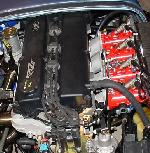 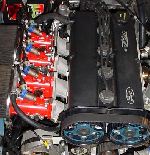 |
Engine
installed in the original
Crossflow location.
To maximize (optimize) the ground
clearance, about a 1/4" needs to be removed from the vertical valve
cover edge, to clear the nosecone.
Even with the engine forward, the feared excessive understeer
has not manifested itself. |
||||||||||
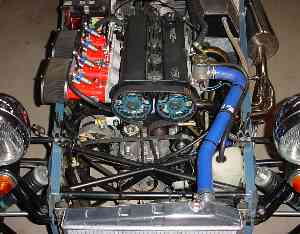 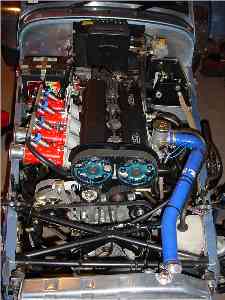 |
Left - Installation complete (note the yellow banded alternator ground lead on the top alternator mounting lug - the three mounting locations have isolating rubber bushings in them, hence the need for this) Right - getting close |
||||||||||
| Comparing 5" and 7" mufflers on the old
Crossflow: |
|||||||||||
|
Original
5" stainless muffler and heat
shield and new 7", both on the XF1700. Just wanted to compare the
difference.
Initial trial run of JW's 7" stainless polished muffler dramatically improved low and mid end Crossflow's running behaviour. Sounds great too. In 2000 I wrote: "Wait and hear what it sounds like on the
Zetec". Well... clearly a lot more power, but not quite the magical
racy
Crossflow
sound. The Zetec comes on nice >4000rpm, and then it starts to sound
good. Over 5000rpm it sounds great. Some
audio from a lap at Black Hawk Raceway. (900kB) The Zetec low end power is quite tremendous, but there are two "power jumps" one at 4000rpm and another around 6000rpm. |
||||||||||
|
Pics:
Top left = constructing
the wiring harness, using the supplied connectors and #16 wire
(ignition / injection / power) and shielded cable for sensors. Top right = Assembled with heat shrink and ty-rap color coding Bottom left = 4.7Ohm/25Watt, injector series resistors. The injectors are low resistance Magneti Marelli items. The resistance limits the holding current, but also shortens the turn on time (proportional to "Inductance/Resistance") Bottom right = first pass tuning session. Eventually the ECU is mounted left of the steering column under the scuttle .. it just fits. |
||||||||||
| The
original GEMS unit failed
(glitches and lost RS232 port function). I replaced this recently (11/06) with a DTA S60 controller. This is quite a step up from the old GEMS, both in control functions, features and user interface and data logging capability. Tuning with this unit is a breeze, as the aux. inputs wired directly to my Wide Band O2 unit (UEGO). The PC user interface is excellent with a wide range of manual and automatic loop control functions. Cold start, sequential injection, rev limiter, etc. It also supports the standard Ford wasted spark (2 x 2) while the injectors can run full sequential. For startup it runs in batch and then switches over at a programmable rpm setpoint (e.g. 1200rpm), to ensure the engine runs smooth, even with a light flywheel (which may otherwise cause cam-errors). The cam sensor is needed for sequential to determine 1 of 4. With batch mode, all you'd have identified is TDC and BDC, not which cycle. Support for DTA is very good, with a web focus group and free updates. |
|||||||||||
